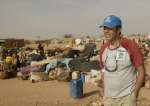UNHCR concerned about conditions in Calais and Dunkerque
News Stories, 5 February 2016
GENEVA, Feb 5 (UNHCR) – The UN Refugee Agency is concerned about some 4,000 refugees and migrants currently reported to be living in the Calais "jungle" and almost 2,500 in Grande-Synthe, on the edges of Dunkerque, often in dire circumstances, aggravated by the winter conditions.
Of particular concern are hundreds of children, many of them traveling by themselves, who arrive at the informal camps in northern France in need of both shelter and adequate protection.
At present there are limited facilities that attend to the specific protection needs of children, including those under the age of 15. Among the few is the Maison du jeune réfugié centre in St Omer, which is run by France terre d'asile.
"UNHCR is specifically concerned about the living conditions of children – in particular unaccompanied and separated children – and would welcome the establishment of additional emergency reception places," UNHCR spokesperson William Spindler told reporters at a briefing in Geneva.
Spindler also highlighted the urgent need to explore other options for simplifying child protection procedures, particularly for those children with relatives in another EU Member State.
He went on to welcome various steps taken by French authorities to provide emergency assistance to the refugees and migrants living in Calais and Grande-Synthe, and address their urgent humanitarian needs.
These measures include the decision to establish a temporary centre called Centre d'Accueil Provisoire (CAP) in Calais, run by La Vie Active, and to organize the voluntary relocation of refugees and migrants to accommodation centres called "Centres d'Accueil et Orientation" (CAO) throughout the country.
The centres provide emergency reception for those willing to avail themselves of it regardless of whether or not they have applied for asylum. As of early February, more than 700 people were hosted in the CAP in Calais and 2,431 people had chosen to go to one of 92 CAOs since the initiative started on 22 October 2015.
"In our assessment, the refugees and migrants living in Calais and Dunkerque would benefit from the intensified provision of information and legal advice. In the current situation, residents of the Calais 'jungle' receive mixed, sometimes inaccurate and conflicting information from a variety of different sources," Spindler said.
"Strengthening the coordination among all actors for the provision of assistance, as well as accurate and objective information, would be key, including to people residing in CAOs," he added.
He noted that at best, the humanitarian assistance provided in these locations is a stop-gap intervention to alleviate the worst suffering. Fundamentally, the individuals concerned need information about their options in France, and those in need of international protection need to be strongly encouraged to seek asylum in France.
"They also need to be informed of the possible consequences if they do not do so," he said. "Another important measure would be ensuring adequate reception facilities, support – including legal assistance – as well as psycho-social care."
Another step is the use of existing legal provisions for those with relatives in other EU Member States to enable them to join their family members quickly. The recent UK court decision where the asylum tribunal judges ruled that three unaccompanied and separated children and an older brother – a dependent of one of the children – should be allowed to join their relatives in the UK while their asylum claims are considered by the Home Office, is a step towards achieving this.
UNHCR has long advocated for the pro-active application of the Dublin III Regulation and urges States to use the opportunity to develop an expedited procedure for unaccompanied and separated children in one EU Member State to join their relatives in another.
UNHCR is prepared to support the authorities in all these measures, including, as of February 8, through an enhanced presence in the Calais region.

















































